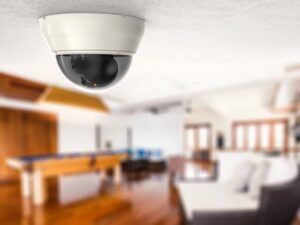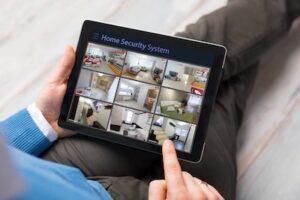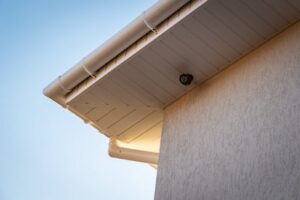Most security cameras are now connected to the internet; however, several wireless alternatives don’t require it. Not being connected means you won’t be able to get notifications when your camera detects motion, view live footage, or remotely turn it off and on, among other things. But if that’s what you’re searching for, keep reading to find out more about the best wireless security cameras that don’t need the internet.
Do Wireless Security Camera Systems Need an Internet Connection?
Wireless security cameras do not require an active internet connection to operate. The video from the wireless security camera can be temporarily stored on an SD card. In a private network controlled by the recorder, an NVR may also be used to store camera footage.
- Wireless security cameras, like most wired security cameras, rely on a network connection to transmit video.
- However, most models include onboard storage as well as batteries.
- This is because you don’t need an active power supply or network connection.
- One thing to remember is it doesn’t last very long, especially if the camera records continuously.
This thought may have crossed your mind:
- I don’t have internet, so what other choices do I have for wireless cameras to function without a connection?
- We will now go over the options for wireless security cameras working without internet.
Wireless Security Cameras Working Without Internet
Wireless cameras can generally be used without an internet connection by connecting to an NVR or a built-in SD card storage. Both alternatives, on the other hand, are restricted to closed-circuit viewing, which means you can’t view the recordings from afar. An internet connection is required for remote monitoring unless you want to view the footage on a computer that’s physically connected to the camera.
Here Are More In-depth Options for Wireless Security Cameras Without Internet:
Network Video Recorders
NVRs can store video from a variety of wireless cameras and make them easier to manage. Several wireless cameras may be connected to the device using LAN cables, with the current footage being transmitted to a monitor or TV for viewing.
- When you want to view the footage remotely, however, you will need an internet connection.
- When you don’t have access to the internet, NVRs are a great alternative for viewing the video.
- It creates a private network with the cameras and manages it so that all security cameras can transmit their data successfully.
A surveillance camera without a network connection can’t be viewed from a remote location. If you connect the NVR to the router, you may use it over the open internet.
Using The SD Card
The onboard SD card storage can be another alternative to NVRs. The majority of wireless security cameras include SD cards so that footage can be stored when the network connection is down.
- This space, on the other hand, is intended for short-term storage and will fill up quickly if the camera is recording often.
- When the security camera has a problem with connectivity, the SD card is usually activated.
This allows wireless cameras to operate with no reliance on the internet and never loses visuals. Remember, it is not a long-term solution and SD cards must be replaced regularly.
What Limitations of Wireless Security Camera Without Internet Are There?
Backups, remote access, and notifications are common in wireless security cameras; however, all three functions require a connection to the internet. In this situation, an NVR may not be of assistance since its private network doesn’t provide an active internet connection.
Here Are Some Challenges Wireless Security Cameras Could Encounter And How To Overcome Them:
Remote Access
- You may access the camera remotely only if your network is connected. The majority of wireless camera models broadcast video via the internet and offer cloud-based storage. In the absence of an internet connection, the device will not transmit remotely, and the footage will be saved on the SD card.
- If you want to keep an eye on your home from afar, the security camera will require an internet connection. To bring the security camera online, try using a mobile hotspot or connecting it to/from the router via a LAN cable. If it’s set up to allow remote access, it should work with either of the two systems.
Being Notified And Alerted
- Triggered cameras can notify homeowners of any activity; however, these notifications or push alerts are also contingent on a steady network connection.
- Based on your demands, we propose you give both the security camera and your handheld device a network connection for these features to function properly.
Backing Up Footage Remotely
- A wireless NVR might set you back a few dollars in addition to the wireless security camera. Fortunately, wireless security cameras come with an internet-based backup function. Cloud storage is used to store the footage from the camera for later viewing.
- If the wireless security camera does not have access to the internet, the functionality is disabled. Even if you use an FTP-based storage system, you won’t be able to save the recording without access to the internet; you may temporarily connect the device using a hotspot or LAN cables for the backup to take place.
Is Wired Or Wireless Security Cameras The Best Option?
The wireless security cameras are a simpler system to set up. They are more easily placed, and wire-free. Wired security cameras, on the other hand, need skilled installation, are inconvenient to manage, and can contribute greatly to your power expenses.
- Either security camera will have good or bad attributes. Both are suitable for particular any type of property.
- A wired network transmits a more steady video quality, as seen in wireless security cameras.
- Wireless cameras send information over the network and are only as stable as the WIFI connection.
- If excellent picture quality isn’t essential, wireless security cameras are fantastic if you aren’t the technical type and want to keep things simple.
An internet connection is not needed for wireless security cameras to do their job. Because of the need for a steady connection, most of the functions are not able to be used. However, these days there are other ways to get connected than using only broadband internet.
- You can connect the camera to the internet using a mobile hotspot as well.
- It all boils down to what you want to accomplish.
- Are the remote capabilities essential?
Get an internet connection if necessary. Otherwise, an NVR should be enough for you to utilize the wireless camera effectively. Since you do not have to plug straight into the mains, you can use batteries. Saving money there you could afford to buy a better quality camera.
How do you power a wireless security camera?
Wireless security cameras can be powered by onboard batteries or via the mains (POE). If it includes an adaptor, you may connect it to a power source.
- You may also link an ethernet cable from the router to a power outlet for both power and transmission.
- Batteries may also be used to supply electricity to the wireless camera if you don’t have an outlet close by.
- The majority of the time, wireless security cameras use standard power supplies (AC or DC) and PoE.
The onboard batteries can endure anywhere from a month to a year, depending on how much they are used. If the camera is in continuous recording mode, the onboard batteries will die considerably sooner than anticipated.
Is There A Need For Security Cameras With WiFi To Have Internet?
WiFi cameras do not require the internet if you do not wish to view footage remotely, back up recordings, or receive notifications. Wireless security cameras generally need WiFi for video transmission.
- However, if you don’t have a WiFi connection, an NVR, Ethernet cables, or SD cards might be used.
- Forget about having to pay for cloud storage; with an NVR, you may store recordings on a hard drive.
Notifications are not available without WiFi or an internet connection if you have a wireless security camera. The camera will not be able to send alerts to your phone if it is not connected to the internet.
- You will not be able to remotely view the footage either.
- You will still be able to see the footage on the SD card, however.
- An internet connection is not required for wireless security cameras to do their job.
Because of the need for a steady connection, most of the functions are not able to be used. However, these days there are other ways to get connected than using only broadband internet.
Summary
No, a wireless security camera does not necessarily need the internet to function.
If you only need local footage without any of the bells and whistles, then you won’t need an internet connection for your camera.
However, if you want to take advantage of any remote viewing or backup features, you will need to have an internet connection.
The best option for you depends on your specific needs and requirements. Consider what you want to use the camera for before making your decision.



